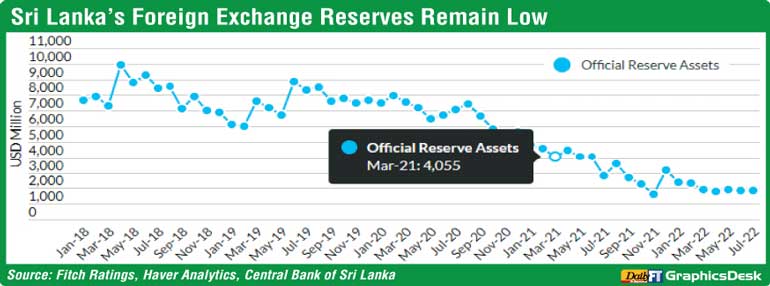Wednesday Feb 18, 2026
Wednesday Feb 18, 2026
Saturday, 3 September 2022 00:11 - - {{hitsCtrl.values.hits}}

Fitch Ratings said yesterday that the IMF Staff-Level Agreement with Sri Lanka on a $ 2.9 billion programme, confirmed on 1 September, appears to signal a sharp change in policy settings in order to achieve macroeconomic stability, including through large fiscal adjustment, greater exchange rate flexibility and more central bank autonomy.
“This should facilitate negotiations with official and private creditors, but the timing of any debt restructuring agreement remains uncertain,” Fitch said.
It said the Extended Fund Facility will not be approved by the IMF’s Executive Board until the Government has implemented a number of agreed prior actions (not publicly specified), financing assurances have been received from official creditors, and good faith efforts have been made to reach agreement with private creditors.
The IMF has assessed Sri Lanka’s debt burden as unsustainable, so the outcome of negotiations with creditors should involve debt relief. Tax reform will be an important element of the agreed program. Personal income tax will be made more progressive and corporate income tax and VAT will be broadened, with a goal of achieving a primary fiscal surplus of 2.3% of GDP by 2025, compared with a deficit of 5.7% in 2021.
In line with this, the interim 2022 budget unveiled by the new Government on 30 August laid out plans to raise the standard rate of VAT to 15% from 12% from 1 September, and proposed compulsory tax registration for all residents aged over 18 years.
The budget sought to raise Government revenue/GDP from 8.2% in 2021 to 15% by 2025, and to reduce public debt/GDP from around 110% at end-2021 to not more than 100% in the medium term. The revised budget deficit for 2022 is projected at 9.8% of GDP, up from 8.8% of GDP in the original 2022 budget.
“We believe the Government has some room to reduce capex, but its non-discretionary expenditure is large,” Fitch said. Interest payments and wages were equivalent to 1.3x Government revenue in 2021.
Fitch also said it expects additional revenue raising to be the main driver of fiscal consolidation, but the budget signalled there will be reallocation of expenditure towards social spending to cushion the effects of the economic crisis.
“Political instability will pose risks to the implementation of reforms and the distribution of IMF funding, even if a debt restructuring is agreed. Additional social spending may not be sufficient to prevent public opposition, particularly given that the Government’s public support appears weak, in our assessment, and that the economic growth recovery in 2023-2024 will be constrained by the strong fiscal consolidation,” Fitch said.
Fitch rates Sri Lanka’s Long-Term Foreign-Currency (LTFC) Issuer Default Rating (IDR) at ‘RD’ (Restricted Default). The Long-Term Local-Currency IDR is ‘CCC’, and is Under Criteria Observation following our introduction of +/- modifiers in the ‘CCC’ category. A default on local-currency debt could have adverse effects on Sri Lanka’s banking sector that would erode the net benefits of such a restructuring.
When Fitch affirmed the Long-Term Local-Currency IDR in May, it assumed that the Government would continue to service local-currency debt. Nonetheless, the ‘CCC’ rating reflects a high risk that local-currency debt will be included in debt restructuring, as the stock and interest costs are large, and omitting it could increase the restructuring burden on holders of foreign-currency debt.
The Central Bank Governor in late August affirmed that Sri Lanka would not restructure domestic debt, but this was partly in response to comments from President Wickremesinghe that appeared to suggest that this policy option was being examined.
Fitch may move Sri Lanka’s LTFC IDR out of ‘RD’ upon the sovereign’s completion of a commercial debt restructuring that it judges to have normalised the relationship with the international financial community.